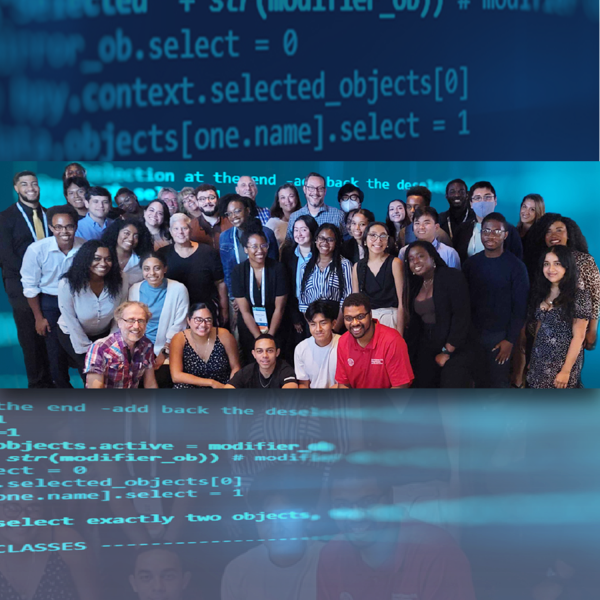October 6, 2022
For those who self-identify as a member of an underrepresented group in tech, it’s not unusual to be in a room where no one else looks like you. To flip the script, the Office of Diversity, Equity, and Inclusion for the Cornell Ann S. Bowers College of Computing and Information Science led a delegation of more than 50 students, faculty, and staff to the Richard Tapia Celebration of Diversity in Computing conference, held Sept. 7 – 10 in Washington D.C.
The annual conference celebrates “the diversity that exists in computing,” giving undergraduate and graduate students in computer and information science the opportunity to network with others who share both their identity and interests in computer science and tech, and to envision potential career paths in industry or academia.
“What I really hope students take away from this conference is that they're not the only person in the world having this experience,” said LeeAnn Roberts, director for the Cornell Bowers CIS’ Office of Diversity, Equity, and Inclusion. “They don't have to travel through this field alone.”
The delegation included six faculty members, David Bindel, Steven Jackson, Robbert van Renesse, Angelique Taylor, Hakim Weatherspoon, and Cheng Zhang, 26 undergraduate students, nine graduate students, and seven staff members. The college’s departments and a grant from the Hopper-Dean Foundation covered student registration and travel costs.
At Tapia, attendees listened to talks on topics ranging from bias in machine learning models and designing accessible tech for people with disabilities, to efforts to increase diversity in the tech workforce and creating a culture of inclusion in computing. Presenters came from both academia and industry, with many people sharing their own challenges in navigating a career in computer science as an underrepresented minority.
Empowering students
Arianna Curillo ‘23, a computer science major, found the workshop “Your Voice…Your Power” to be especially moving. It discussed ways to harness one’s voice to be heard and valued within an organization. “It was all women of color in the room, so it was a really nice space to be in – really inspiring,” she said. “It was an empowering feeling to see people who look like you speaking their truth.”
When she first came to Cornell, Curillo felt conspicuous as a minority, but after joining the Underrepresented Minorities in Computing (URMC) group on campus, she found her community. “It was a shock when I went to intern over the summer and I was one of the only women of color there,” she said.
Curillo is now president of the URMC, and leads its efforts to support Black, Latinx, and Indigenous students pursuing careers in tech through academic review sessions, mock interviews, resume reviews, and social events. Its membership was well represented at the conference.
Another valuable experience at Tapia is the career fair, where students can network with top employers including Meta, Google, Duolingo, and Jane Street.
The conference was a success for Ana Smith, a doctoral student in the field of computer science, who lined up a job interview after meeting a researcher from the MIT Lincoln Laboratory. She hopes to wrap up her Ph.D. work in natural language processing – developing tools to analyze conversations – in Spring 2023 and is currently on the job market. The first Tapia conference she attended in 2018 also paid off – it landed her an internship at IBM Research.
To anyone on the fence about attending Tapia, Smith advises, “You should just do it.”
“So much of what you get out of it is the opportunity to practice talking about your research, talking to people outside your field, and just getting out and building professional skills, which are difficult to build at a university,” Smith said. “At Tapia, people just care that you succeed.”
Advancing DEI efforts in tech
Tapia is not only focused on student enrichment; it’s also an excellent venue for DEI professionals to share what has worked in their own efforts.
David Bindel, associate professor of computer science and associate dean for diversity, equity, and inclusion at Cornell Bowers CIS, participated in a panel discussion along with other researchers involved in the LEAP Alliance, an NSF-funded initiative to increase minority representation in computer science research leadership. He presented on the college’s efforts to diversify the computer science doctoral student population – and ultimately the faculty.
“By diversifying the future academic leadership in computing, we hope to create ripple effects across the entire field that will bring more people from marginalized backgrounds into computer science,” Bindel said.
Roberts and Cass D’Amato, assistant director for diversity, equity, and inclusion, also presented on their DEI efforts at the college. They shared the strategies that have worked at Cornell to improve the retention and wellbeing of students belonging to underrepresented minority groups and help them find a sense of belonging.
Sending a delegation to Tapia is one of the college’s many efforts to diversify the tech workforce and make Cornell Bowers CIS a more welcoming place for people belonging to underrepresented minority groups – and the efforts are starting to pay off. Among undergraduate computer science majors at Cornell, 38 percent are women, compared to 18 percent nationally; 14 percent belong to an underrepresented minority group, compared to 6 percent nationwide.
“This is definitely the proof that what we’re doing is working,” Roberts said. “Because if it wasn’t, we wouldn’t have all of these students and faculty here at Tapia.”
Patricia Waldron is a writer for the Cornell Ann S. Bowers College of Computing and Information Science.



